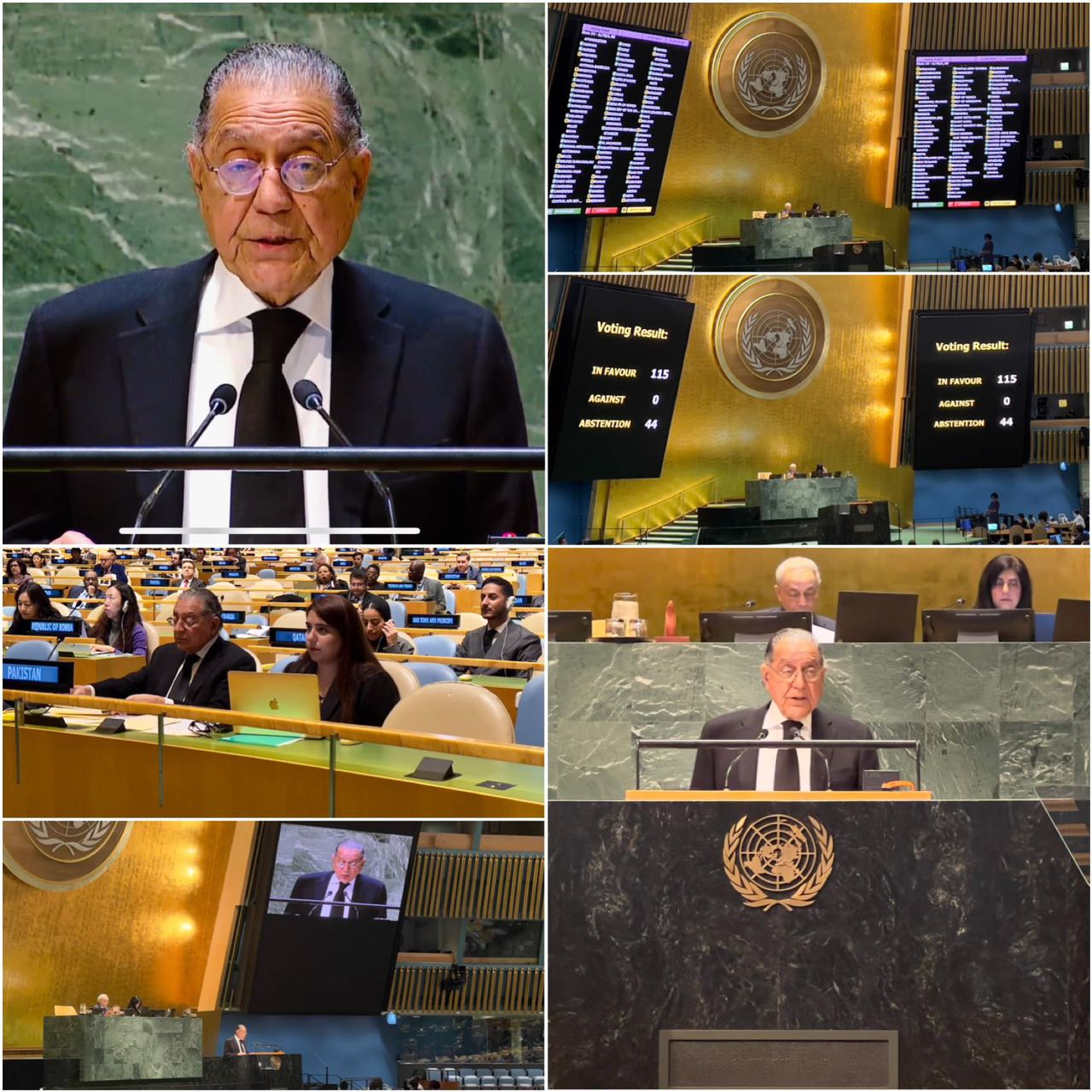 15 March 2024, New York: In a major development today, the United Nations General Assembly adopted a resolution titled “Measures to Combat Islamophobia,” (A/RES/L.48) with an overwhelming majority. Pakistan on behalf of the Organization of Islamic Cooperation (OIC) presented the resolution as a follow-up of the General Assembly Resolution 76/254, which designated March 15 as the International Day to combat Islamophobia.
15 March 2024, New York: In a major development today, the United Nations General Assembly adopted a resolution titled “Measures to Combat Islamophobia,” (A/RES/L.48) with an overwhelming majority. Pakistan on behalf of the Organization of Islamic Cooperation (OIC) presented the resolution as a follow-up of the General Assembly Resolution 76/254, which designated March 15 as the International Day to combat Islamophobia.
The adoption of the resolution comes at a critical time, amidst the escalating global phenomenon of Islamophobia, as manifested in an increasing number of incidents of discrimination, violence, and incitement against Muslims. The ongoing tragedy in Palestine serves as a stark reminder of the grave repercussions of Islamophobia, highlighting the critical imperative to combat prejudice and promote a world founded on tolerance and understanding.
As a significant outcome, the General Assembly has called upon the Secretary-General to appoint a “United Nations Special Envoy to combat Islamophobia”. This historic appointment will be the first of its kind, exclusively dedicated to combating the issue of Islamophobia.
Through the text of the resolution, the General Assembly condemned the incitement to discrimination, hostility or violence against Muslims as manifested in the increasing number of incidents of desecration of their Holy book, attacks on mosques, sites and shrines and other acts of religious intolerance, negative stereotyping, hatred and violence against Muslims.
The General assembly, through the text of the resolution called upon Member States to take all necessary measures, including legislative and policy measures to combat religious intolerance, negative stereotyping, hatred, incitement to violence and violence against Muslims and prohibit by law, incitement to violence and violence against persons on the grounds of their religion or belief. The Assembly further reaffirmed the obligation of Member States to prohibit discrimination and violence on the basis of religion or belief and to implement measures to guarantee the equal and effective protection of the law.
Earlier while introducing the resolution in the UN General Assembly on behalf of the OIC, Ambassador Munir Akram, the Permanent Representative of Pakistan to the United Nations, delivered a compelling statement urging the international community to take bold measures to combat Islamophobia.
Expressing gratitude to President of the General Assembly Ambassador Denis Francis for convening the meeting on March 15, which marks the International Day to Combat Islamophobia, Ambassador Akram highlighted the significance of this occasion. He emphasized the urgent need for global action to address the growing incidents of discrimination, prejudice, and violence against Muslims worldwide.
Reflecting on the historical roots of Islamophobia and its resurgence after the terrorist attacks of 9/11, Ambassador Akram underscored the alarming rise of Islamophobic incidents despite previous resolutions and declarations condemning such behavior. He lamented the despicable acts of desecration of the Holy Quran, lynching of Muslims, hate speech, discrimination in education and employment, attacks on women wearing the hijab, and vandalism of mosques.
Ambassador Akram criticized the reluctance of many governments to adopt laws preventing and punishing Islamophobia, often citing the right to freedom of expression as a pretext. He highlighted the propagation of Islamophobia by certain political leaders and the rise of right-wing and fascist parties globally, leading to an emerging “coalition of the killing.”
Furthermore, Ambassador Akram condemned Israel’s military onslaught in Gaza, describing it as the most egregious manifestation of Islamophobia and racism. He called for bold and decisive actions to counter Islamophobia, emphasizing the importance of Draft Resolution L.48 as a step towards this goal.
Addressing last-minute amendments proposed by certain delegations, Ambassador Akram reaffirmed opposition to changes that undermine the resolution’s objectives. He urged fair-minded delegations to reject these amendments and support the balanced text of Draft Resolution L.48.
In conclusion, Ambassador Akram expressed confidence that the international community would unite in combating Islamophobia and other ideologies of hate, domination, and division. He called on world leaders to stand against those promoting Islamophobia and obstructing consensus on this critical issue at the UN General Assembly.
Sub Editor: Ghufran